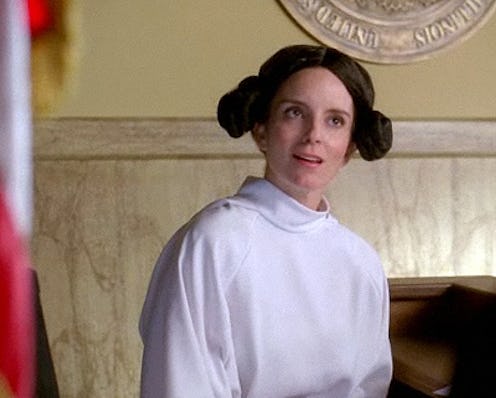Entertainment
Revisiting Liz Lemon's Feminism 10 Years Later

If you can believe it, 30 Rock premiered ten years ago this October, and it's hard to imagine a world without Tina Fey’s frantically-paced and hilariously funny sitcom. A lot has changed since the premiere. Liz Lemon considered herself a feminist, but given how much has changed since the show's 2006 premiere, and the national and international conversation surrounding women’s rights, the character presents a unique challenge for today's audiences.
Liz Lemon, the main character of 30 Rock and creator and head writer of the (originally) female-centric comedy show-within-a-show TGS, is a self-identified feminist. She's quick to defend a woman’s right to choose and to expose the double standards of the entertainment industry. She celebrates Anna Howard Shaw Day instead of Valentine’s Day and got married in a Princess Leia costume. The show often explores and critiques Liz’s relationship to feminism; in the buzzy "TGS Hates Women" episode, Liz condemns a comedian's exaggerated performance of femininity, a complaint that is revealed to be rooted in Liz's own insecurities and ends up jeopardizing the other woman's safety.
In that same episode, Liz rushes to the defense of a TGS sketch about historic female figures getting their periods as “an ironic re-appropriation" before breaking down and admitting that she doesn't even know anymore. The joke about the blurred line between parodying sexism and actually being sexist serves as an example of what cultural theorist Rosalind Gill critiqued as the “postfeminist” desire to have “'it both ways’, of expressing sexist sentiments in an ironised form, while claiming this was not actually 'meant.’” It is also a critique of Liz Lemon and 30 Rock itself as a show that made fun of Liz's feminism and status as a single career woman as much as it poked fun at her sexist detractors.
There are instances in 30 Rock that make me cringe. Jack Donaghy’s expertise, especially when it comes to Liz, is rarely challenged, and it is both a joke and a fact that his commanding mentor presence comes solely from his status as a rich, successful white man. The fact that, too often, men are de facto experts brimming over with unsolicited opinions has been well documented in scientific studies and in the 2016 election. Only in 30 Rock's finale does Liz realize that Jack might be nothing more than “an alcoholic with a great voice.” After all, Liz is a woman with her own TV show; why does everyone consider her a failure?
It’s important to note that 2006, when the show premiered, was a different time for feminism. Beyoncé hadn’t proclaimed herself a feminist on the stage of the VMAs, Emma Watson was just a teen movie star, and they were still making Ocean's 11 movies with men in them. As a self-proclaimed feminist and woman whose plot lines often centered on the struggles of working women in a male dominated world, it’s hard to complain too much about Liz Lemon’s feminism when there were so few characters like her on television. Looking back on the show, and rewatching the whole series (as I have done countless times), its effects have been surprisingly feminist, if not perfectly so.
Watching 30 Rock as a high school student, Liz Lemon’s funny imperfections were some of the only reassurance I had that not always being cute and having my act together was not the end of the world. While Liz's ineptitude was unfairly and hilariously exaggerated, the world's criticism never seemed to get her down. Obviously, this has something to do with the fact that the lead character in a sitcom can't spend much of her time in a depressive spiral. However, seeing a woman's gross, unattractive, and inept flaws portrayed as funny, rather than worthy of despair, had a much better effect on my not unusually hypercritical teen self than perennially graceful, attractive characters like Rory Gilmore or Bella Swan.
In addition to what I personally learned from Liz Lemon, I think discourse in 2016 has something to glean from her imperfections. Many feminist media critiques seem to require all feminist characters to gracefully rise above societal pressures. Joyce of Stranger Things came under fire for daring to let her son’s disappearance get her down in the same way Liz Lemon was criticized for listening to a confident man in a moment of uncertainty. These demands seem to prefer that feminist art depict an egalitarian utopia, rather than patriarchal society as it currently exists.
Yes, Liz Lemon was baby crazy and seriously considered settling for a man who was annoyed that the hot tub in Hot Tub Time Machine got hot too quickly, but she was also constantly under pressure from her parents, boss, and strangers to get married and have children. Those pressures on working women were real in 2006 and continue in 2016, and those who succumb to them deserve a place in feminist media. Hurling implacable female role models at the impressionable public creates a false version of the world in which sexism’s effects aren’t real. I prefer flawed feminism and female characters who sing “Night Cheese.”
Image: NBC, Giphy (2)